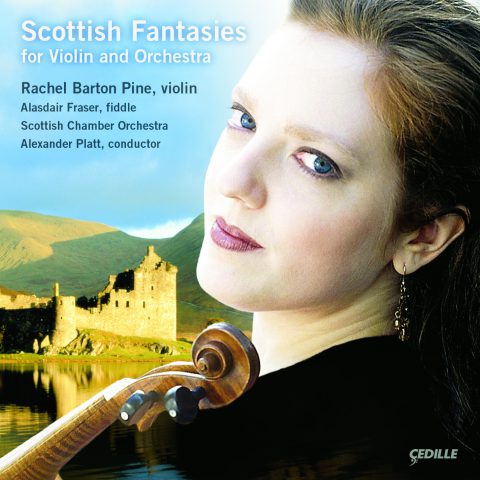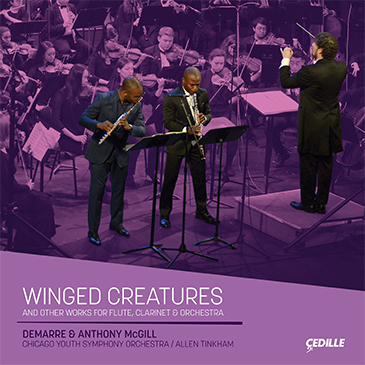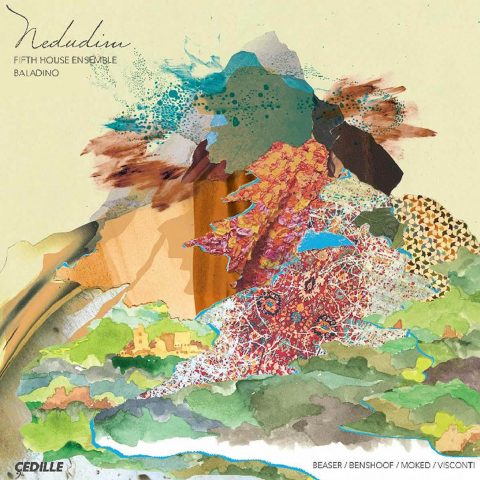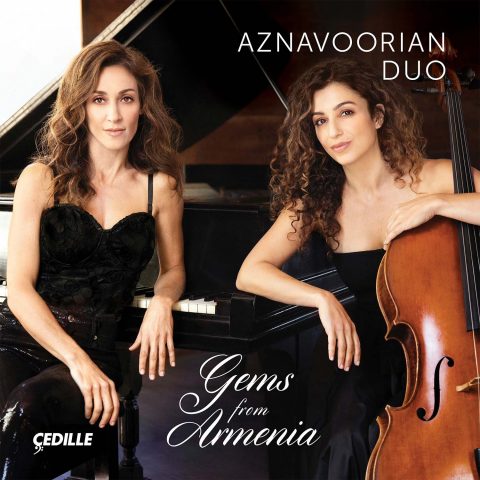| Subtotal | $18.00 |
|---|---|
| Tax | $1.85 |
| Total | $19.85 |
Store
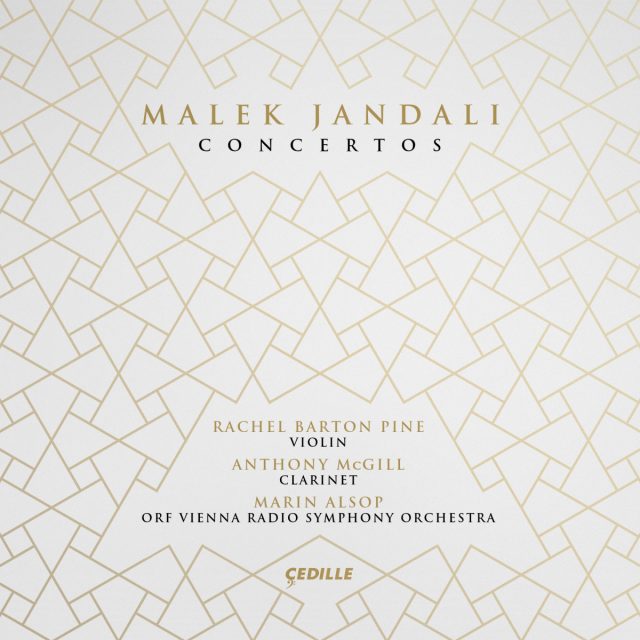
Violinist Rachel Barton Pine and clarinetist Anthony McGill are featured soloists on a new recording of two concertos composed in response to societal injustice by Syrian American composer Malek Jandali, performed with the ORF Vienna Radio Symphony Orchestra led by renowned conductor Marin Alsop, a champion of the composer’s work.
Malek Jandali, called “deeply enigmatic” by Gramophone, has been praised for writing “heart-rending melodies, lush orchestration, clever transitions and creative textures” (American Record Guide). His repertoire, which ranges from chamber music to large scale orchestral works, integrates Middle-Eastern modes into Western classical forms and harmony.
Rachel Barton Pine, “an exciting, boundary-defying performer” (Washington Post), performs Jandali’s Concerto for Violin and Orchestra (2014), a work that honors “all women who thrive with courage,” according to the composer. Jandali wrote this concerto in recognition of the women of Syria, continuing his aim to preserve the cultural heritage of his homeland.
The Violin Concerto incorporates Syrian melodies and idioms into Jandali’s Western-inspired harmonies and forms. Jandali calls upon an array of Syrian and Arabic music forms and folk melodies including multiple samā’i and bashraf (instrumental pieces), and longa (dances), from different maqam (modes). He also makes use of the oud (Arabic lute) in his symphonic scoring to infuse the work with the authentic sound and feeling of Syria.
A particularly notable samā’i inspired by traditional Syrian folk music from the area along the Silk Road is used for a “Women’s Theme.” This theme is representative of the folk music that is a source of comfort and healing for unjustly detained, peaceful Syrian activists and other women and mothers living in fear.
Jandali’s Concerto for Clarinet and Orchestra (2021) is dedicated to its first performer, Anthony McGill (“the total package… stylish, passionate and limitlessly fluent on the clarinet” (Bachtrack)), “in memory of all victims of injustice.” McGill says of the work, ”In the midst of the pain and the violence and injustice in the world all we are left with is the ability to pour our hearts and our souls into something more beautiful, into something more powerful, so it can communicate throughout all time and live on.”
Like all of Jandali’s works, the clarinet concerto is infused with ancient themes from Jandali’s homeland as a means of preservation. Jandali explores variations on themes from old and traditional Syrian musical forms and modalities, with striking musical effects and wide-ranging highs and lows in the orchestral writing.
The full album will be available May 12, 2023, with advance digital singles scheduled for release on April 21 and May 5.
Rachel Barton Pine has recorded more than 20 albums for Cedille Records, including the recently released Violin Concertos by Black Composers Through the Centuries: 25th Anniversary Edition, which features a new recording of Florence Price’s Violin Concerto No. 2 with the Royal Scottish National Orchestra led by Jonathon Heyward. This is Anthony McGill’s sixth recording for Cedille Records, following the 2022 release of American Stories, featuring music by living American composers performed by McGill with the Pacifica Quartet.
Preview Excerpts
Malek Jandali
Concerto for Violin and Orchestra
Concerto for Clarinet and Orchestra
Artists
1: Rachel Barton Pine, Marin Alsop, Vienna Radio Sym.
2: Rachel Barton Pine, Marin Alsop, Vienna Radio Sym.
3: Rachel Barton Pine, Marin Alsop, Vienna Radio Sym.
4: Anthony McGill, Marin Alsop, Vienna Radio Sym.
5: Anthony McGill, Marin Alsop, Vienna Radio Sym.
6: Anthony McGill, Marin Alsop, Vienna Radio Sym.
Program Notes
Download Album BookletConcerto for Violin and Orchestra
Notes by Jane Vial Jaffe
A concerto for a woman, played on a famous violin named for a woman, with an orchestra conducted by a woman — what better way to honor “all women who thrive with courage”? Malek Jandali began composing his Violin Concerto in New York City in 2013, completing it in January 2014, originally with violinist Gidon Kremer in mind as the dedicatee. As the project took shape, however, with its emphasis on women who have transcended great obstacles, he rededicated it “To Rachel Barton Pine and to all women who thrive with courage.” Pine recorded it on the 1742 Giuseppe Guarneri “del Gesù” violin, previously known as the “ex-Bazzini” but now as the “ex-Soldat” after violin virtuoso Marie Soldat of Johannes Brahms’s circle. On Brahms’s recommendation she had studied with Joseph Joachim and for a time was the only woman to play the Brahms Violin Concerto. To conduct, Jandali sought out Marin Alsop, one of today’s most successful women in the field, who has recorded most of his symphonic works.
Here are just some of the women Jandali sought to honor in this music:
- Tal al-Mallohi, who expressed her feelings through poetry, which led to her arrest in 2009 and sentencing during the first year of the Syrian revolution
- Razan Zaitoneh, human rights lawyer, who went into hiding after being accused of being a foreign agent during the Syrian Revolution, now thought to have been killed
- Rania all-Abbasi, dentist and chess champion, who was arrested in 2013 for unknown reasons and has not been heard of since along with her husband and their six children
- Linah Droubi, Jandali’s mother, who with his father, Dr. Mamoun Jandali, was brutally beaten in Syria after Malek performed at a 2011 peaceful protest in front of the White House
In honor of these women and continuing his aim to preserve the cultural heritage of his homeland, Malek Jandali adds his Violin Concerto to his large body of work that incorporates Syrian melodies and idioms into Western-inspired harmonies and forms. Jandali incorporates the oud (Arabic lute) in his symphonic scoring to infuse the work with the authentic sound and feeling of his beautiful but ravaged Syrian homeland. Says Rachel Barton Pine, “Just hearing that sound as I’m playing my music on this Western instrument in this Western symphony context was really very inspiring and helped me capture the flavor of what I was doing that much better.”
The first movement’s restless introduction, culminating in a shimmering cascade, sets the scene for the violin’s entrance, which draws on a lovely samā’i (instrumental piece) in the Zunkalah maqam (its specific mode) by Aleppo musician and scholar Alī al-Darwīsh (1884–1952). This and all the other samā’i Jandali uses in the work are in 10/8 meter, providing a unifying feature. When the violin heads up into the stratosphere on a high, held harmonic — with the oud making its first appearance — the horn enters with the second main theme, soon taken over by the violin. Jandali calls this his “Women’s Theme,” inspired by traditional Syrian folk music from the area along the Silk Road, which reached Palmyra and Aleppo. The ”Women’s Theme” and others in both the Violin Concerto and the Clarinet Concerto were a source of comfort and healing for unjustly detained, peaceful Syrian activists and other women/mothers living in fear. Jandali’s use of them poignantly draws attention to the devastating loss of Syria’s ancient culture.
Jandali’s next integration, from an old Arabic bashraf, an instrumental form that would often precede a samā’I, provides metric/rhythmic contrast. One of the most dramatic passages comes with the crashing discord of the orchestra followed by the poignant beauty of a duet between the flute and violin. Other highlights of the movement include an extremely virtuosic and extended cadenza for the violin and the return of the oud in dialogue with the violin “remembering my homeland,” says Jandali, preparing us for the melancholic slow movement.
The Andante begins with an old Syrian samā’i characterized by an expressive leap then winding gracefully along its way. The solo violin reintroduces the theme, soon soaring to astral heights as its lament becomes more and more ethereal. Jandali introduces four other samā’i in succession: an atmospheric oboe theme that stems from an old samā’i in the Hijaz maqam by Yousef Basha; another old samā’i as the solo violin’s response; yet another samā’i for the full orchestra; and finally a samā’i that forms the basis of a passage for violin with oud accompaniment. A grand climax leads to the return of the opening theme, and the elegiac movement concludes with mournful violin utterances joined by the elegant oud.
The solo violin launches the final movement in a livelier dance vein with another samā’i, after which the oud takes up a samā’i in the Kar Jghar maqam by Tatyos Efendi (1858–1913), characterized by dotted rhythms. Fragmented jabs and a grand orchestral preview bring on the violin’s rendition of a jaunty Longa Hijaz in 2/4 meter, a longa being a dance usually performed by women at the end of a muwashshah (poetic and musical form). After the violin soars high above the texture, the violas signal the entrance of the final folk tune, which the solo violin quietly presents. Jandali is a master at organically and seamlessly developing and varying his melodic materials immediately in ways that involve his entire orchestral palette — a case in point here has the flute in dialogue with the violin — but always with the overarching shape in mind. Thus, after a huge climax, a dramatic pause, and an orchestral “glimmer of hope,” the mood darkens, out of which the violin, with eerie poignancy, closes with a slow, expanded version of the movement’s opening theme.
Concerto for Clarinet and Orchestra
Notes by Jane Vial Jaffe
As with Mozart writing clarinet works for Anton Stadler or Brahms for Richard Mühlfeld, Jandali wrote this work specifically for Anthony McGill, principal clarinetist of the New York Philharmonic and professor at both the Juilliard School and Curtis Institute. Says Jandali, “I met Anthony for the first time on June 15, 2018, at the League of American Orchestras’ 73rd National Conference in Chicago and asked him if he would be interested in having a clarinet concerto written for him, and he said yes!” Written primarily in 2019 in New York City and Atlanta and completed in February 2021, the work is dedicated to McGill “in memory of all victims of injustice” and, like all of Jandali’s works, is infused with ancient themes from Jandali’s homeland as a means of preservation.
Reflecting on that dedication during the recording sessions in Vienna in May 2022, McGill said, “In the midst of the pain and the violence and injustice in the world all we are left with is the ability to pour our hearts and our souls into something more beautiful, into something more powerful, so it can communicate throughout all time and live on.” He also reflected on how deeply the work affected him: “There are so many moments in this piece that really, really spoke to me deeply. And when I’m playing them, it makes me connected to something that maybe I wasn’t familiar with before. And that’s an amazing feeling to try to step inside the hearts of the Syrian people.”
Marin Alsop, who has worked with Jandali for many years on many different projects, emphasizes the moral thread that runs through Jandali’s music. “Malek composes in some ways very traditionally because he uses notation and techniques that the instrumentalists are familiar with; but like Bartók did, like Dvořák did, he uses his cultural folk music as a real underpinning for developing these themes, developing these ideas. But the most important part of the story always is the moral. . . . My job is to find the moral to the story and get that across, and Malek’s music is very, very strong in its intentionality and its desire to really stand up for those who don’t have a voice.”
Melodic fragments emerge out of the mysterious orchestral introduction, colored by “ticking” xylophone interjections and rustling flutter-tonguing and tremolos, all coalescing into the solo clarinet’s entrance. A judicious pause brings on the first main theme, which comes from a wasla (cycle of instrumental and vocal pieces) in the Hijaz Kar maqam — a traditional muwashshah called “Zarani al Mahboub” (My beloved visited me), specifically in the Masmoudi rhythm. After a sprightly continuation, another pause brings on the second main theme — an ancient Syrian samā’i — also in the clarinet. McGill singles out this soft theme as particularly moving, saying “It has this rhythm that makes me feel as though I’ve stepped back in time, that I’m connecting into something much, much greater than myself.” The clarinet part becomes incredibly virtuosic, often landing on a flutter-tongued note representing the pleas of the victims of injustice. The ternary form comes full circle with a return to the first theme.
The second movement, Nocturne (literally “night piece”) consists of six short continuous variations on a theme from an old Syrian muwashshah titled “Ya ghazali” (My beloved, how did they take you from me?) in the Hijaz maqam. The theme is subject to variation at the outset, hence the movement’s opening is already designated “Variation 1.” The furtive rustlings, tremolos, and darting interjections throughout bring to mind Bartók’s famous “night music” passages.
The finale grows out of the quiet of the preceding movement with steady pulsing and periodic splashes of struck suspended cymbals. The energetic first theme is based on an old Syrian bashraf in 4/4 meter, which soon becomes dazzlingly virtuosic for the clarinetist. The quieter second theme, also introduced by the clarinet, stems from a traditional Syrian wasla in the Bayati maqam, namely the muwashshah “Ya hilou al lama” (roughly “Oh sweet one and smiling”). Striking orchestral effects, ranging in pitch from extremely low to extremely high, lead to an acrobatic cadenza that shows off the clarinet in all its registers. The work concludes with a vigorous, festive dance for all that offers a suggestion of light and hope in the midst of darkness.
Album Details
EXECUTIVE PRODUCER
Malek Jandali
MUSIC PRODUCER
Erich Hofmann
SESSION ENGINEER
Friedrich Trondl
MIXING AND MASTERING
Bill Maylone
ENGINEERING ASSISTANTS
Wilhelm Wimmer
Wolfgang Wesely
EDITING ASSISTANTS
Manuel Radinger
Miloš Ikić
BOOKLET AND COVER PHOTO
Theresa Wey, Dan Carmody
GRAPHIC AND LAYOUT DESIGN
Veselić&Veselić
RECORDED
May 27–29, 2022 at Funkhaus Wien Großer Sendesaal in Vienna, Austria
PUBLISHED
Concerto for Violin and Orchestra © 2021 Malek Jandali – Soul b Music
Concerto for Clarinet and Orchestra © 2021 Malek Jandali – Soul b Music
CDR 90000 220
